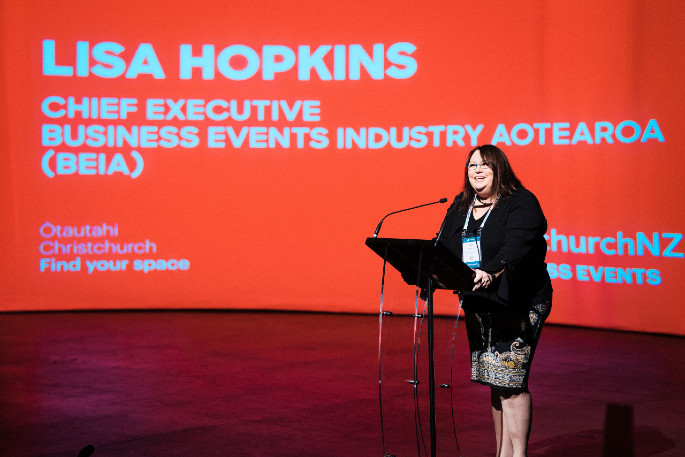With the borders set to reopen fully next month and the removal of the pre-departure tests recently, the international business events market can start to return to New Zealand.
But what is this market worth to the economy, and will non-COVID developments affect how this market plays out here?
Business Events Industry Association CEO Lisa Hopkins says BEIA was expecting business events to return to pre-COVID levels by 2025, and they were hoping for as early as 2024.
She says a majority of business events are domestic, but there’s also a good proportion from overseas markets entering the New Zealand events space, too.
“It is a very rough 75/25 split,” says BEIA CEO Lisa Hopkins.
“Seventy five per cent is domestic and 25 per cent international – including Australia. However, international tends to have a higher value attached to them because of spend, activities, length of stay, access to retail, that sort of thing.”
Australia typically adds the most to the New Zealand business events market, she says, but traditionally, New Zealand has been a popular destination for North America, China and Southeast Asian incentive business.
And in the coming months, Lisa says BEIA will be working closely with Tourism New Zealand to target these core markets for business events.
“Australia is a given, but we also had representatives from Tourism New Zealand’s Singapore and Los Angeles offices at MEETINGS this year – so we will also be looking to engage with meeting planners and organisers in those locations as well.
“Much of that has to do with connectivity of flights, particularly the increase in flights into the USA, including Air New Zealand’s direct flight to New York and resumption of the Chicago direct flight later in the year.”
Despite the US S&P 500 being declared a ‘bear market’ earlier in the month and continuing rising inflation rates in the US, Lisa says the sector isn’t overly concerned at the moment about it impacting business events.
A ‘bear market’ is a term used to describe a market fall of 20 per cent or more from the 52-week high. It is typically marked by investor pessimism which can cause prices to continue falling.
“It is certainly something we have seen impact the market in the past, and we will continue to keep an eye on this, however the antidote to this as far as our sector is concerned, is the longer lead time,” says Lisa.
“What we have to focus on is encouraging customers to continue with their pre-planning, whether that is 12 months or 12 years!
“MEETINGS showed us that there still is the strong desire to meet and connect and while current geo-political and financial challenges can certainly influence, we know that COVID created a vacuum in that most human need to connect.
“We now have the opportunity to continue to focus on the domestic and trans-Tasman opportunities in the short to midterm, and trans-Tasman and international opportunities in the long term.”
Tourism Minister Stuart Nash said in his MEETINGS speech last week that business events visitors are high value to the New Zealand tourism market.
“All the data shows that international conference visitors actually spend more than any other sector of the visitor economy,” he said in his opening speech.
“We also know that delegates who have a really good experience here often come back as tourists, hence the reason it is so important we give them a world-class experience here; they leave as storytellers and come back with their family and their friends and spend a lot of money.”
It’s a sentiment that Lisa agrees with.
“I completely agree with the Minister on this and it’s important to define the distinction between someone who is high value and someone who visits New Zealand and has the money to spend on an experience which sits at the top end of the ‘luxe’ scale.
“People who attend a conference are typically well-travelled and many are traveling to the event, sponsored by their organisation or association.
“Even if that’s not the case, they are typically experiential travellers who will stay in a four-to-five-star business hotel, over three to four nights, eat in a restaurant each night, and then, due to the amount of travel to get here, may spend a couple of days in the same or another region, having some leisure time.
“This visitor is also more likely to return with friends and family for a secondary visit as a leisure traveller. The catalyst, however, is the event which has drawn them to New Zealand in the first place.”



